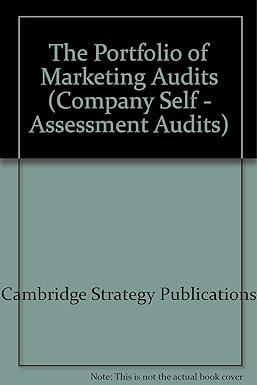Question
Joan Hill, President of Hill & Hill Pens, was looking forward to receiving the companys second quarter income statement. She knew that the sales budget
Joan Hill, President of Hill & Hill Pens, was looking forward to receiving the companys second quarter income statement. She knew that the sales budget of 20,000 units sold had been met during the second quarter and that this was an increase of 25% over the first quarter sales units. She was happy about the increase in sales, since Hill & Hill Pens was about to approach its bank for additional loan money for expansion purposes. She anticipated the strong second-quarter results would be a real plus in persuading the bank to extend the additional credit.
For this reason, Joan was shocked when she saw the first two quarters income statement below. Instead of increasing operating income, there was a decrease.
| Hill & Hill Pens Income Statements For the First Two Quarters | ||||
|
| First Quarter | Second Quarter | ||
| Sales |
| $1,600,000 |
| $2,000,000 |
| -COGS |
|
|
|
|
| Beg Inv | $ 210,000 |
| 490,000 |
|
| COGM | 1,400,000 |
| 980,000 |
|
| -End Inv | <490,000> |
| < 70,000> |
|
| +/- Adj for PVV | 0 |
| 240,000 |
|
|
|
| 1,120,000 |
| 1,640,000 |
| = Gross margin |
| $ 480,000 |
| $ 360,000 |
| -Selling & Admin |
|
|
|
|
| Variable |
| 80,000 |
| 100,000 |
| Fixed |
| 230,000 |
| 230,000 |
| Operating Income |
| $ 170,000 |
| $ 30,000 |
Joan was certain there had to be an error somewhere and immediately called the controller into her office to find the problem. The controller stated, The operating income is correct, Joan. Sales went up during the second quarter, but the problem is in production. You see, we budgeted to produce 20,000 units each quarter, but a strike in one of our suppliers plants forced us to cut production back to only 14,000 units in the second quarter. Thats what caused the drop in operating income.
Joan replied, I dont understand this! I know sales increased, yet you talk about production to explain the drop in income! What does this have to do with the sales that we made? If sales go up, then income ought to go up.
Budgeted production and sales for the year, along with actual production and sales for the first two quarters are given below:
|
| 1st Quarter | 2nd Quarter | 3rd Quarter | 4th Quarter |
| Planned (budgeted) sales | 16,000 | 20,000 | 20,000 | 24,000 |
| Actual sales | 16,000 | 20,000 |
|
|
|
|
|
|
|
|
| Planned (budgeted) production | 20,000 | 20,000 | 20,000 | 20,000 |
| Actual production | 20,000 | 14,000 | - | - |
The companys plant is heavily automated, so fixed manufacturing overhead costs total $800,000 per quarter. Variable manufacturing costs are $30 per unit. The fixed manufacturing overhead cost is applied to units at the rate of $40 per unit (based on the budgeted production shown above ? $800,000/20,000 units = $40 per unit). Any Production Volume Variance is closed directly to COGS for the quarter.
The company had 3,000 units in inventory at the start of the first quarter. Variable selling and administrative expenses are $5 per unit.
Required:
Prepare a variable cost (contribution format) income statement for the first two quarters. (worth 40%)
Explain why the operating incomes are different. (worth 20%)
Explain why the first quarter has a $ 0 Production Volume Variance (PVV) and the second quarter has a $240,000 PVV. Why is the $240,000 PVV added to COGS? (worth 20%)
Given that you may need to consult with owners of small-sized business in the future, what are some of the advantages and disadvantages of preparing a variable costing method income statement for them? (worth 20%)
Step by Step Solution
There are 3 Steps involved in it
Step: 1

Get Instant Access to Expert-Tailored Solutions
See step-by-step solutions with expert insights and AI powered tools for academic success
Step: 2

Step: 3

Ace Your Homework with AI
Get the answers you need in no time with our AI-driven, step-by-step assistance
Get Started


